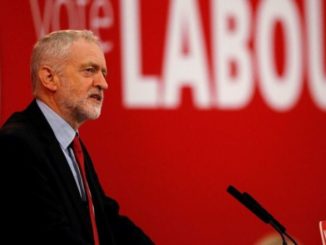
An open letter signed by over 20 prominent British Palestinians, including academics, journalists, businessmen, philanthropists, musicians and lawyers, expressed concern over the shrinking space in the Labour Party to discuss the Palestinian struggle.
They voiced concern over the Labour leadership’s decision to adopt the controversial IHRA definition of anti-Semitism without reference to the concerns regarding the threat it poses to the right of Palestinians and of party members to advocate for justice for the Palestinian people.
Kenneth Stern, one of the drafters of the definition, has warned of the dangers of weaponizing the IHRA code which conflates anti-Semitism with criticism of Israel in 11 of the 13 examples cited in it. The code has also been heavily criticized by Palestinian civil society as well as over 80 BAME organizations, including Black Lives Matter UK, prominent members of the Jewish community, leading lawyers and academic experts on anti-Semitism and the Institute for Race Relations.
An open letter has been signed by 20+ prominent British Palestinians including academics, journalists, businessmen, philanthropists, musicians & lawyers expressing concern over the shrinking space in the Labour Party to discuss the Palestinian struggle. https://t.co/DlBalxICtE
— PSC (@PSCupdates) September 18, 2020
Despite these concerns, Labour’s new General Secretary David Evans recently wrote to all Constituency Labour Party (CLPs) proscribing any debate or discussion about the definition.
The letter notes that the signatories had previously expressed their fears over “how the space to publicly bring the facts of the Palestinian people’s history and ongoing dispossession into the public domain was under severe threat.” They explained that this chilling effect over discussions about Israel had penetrated the Labour Party, which prompted their decision to write a second letter.
“We believe that an internationalist Labour Party has a special responsibility to redress the ongoing injustices against the Palestinian people,” said the open letter noting that the indigenous people of the territory were “denied their right to self-determination during the British Mandate because of the role Britain played as a colonial power leading up to the 1948 Nakba, when Palestinians were forcibly displaced from their homes.
In April, the UK Supreme Court backed the right to boycott Israel, its racism and oppression of Palestine. Now the BDS campaign has won again, this time in the European Court. The dishonest witch-hunt that crippled the Labour Party is falling apart.https://t.co/9IuJYLZcwy
— John Pilger (@johnpilger) June 11, 2020
The letter praised Labour’s position over Israel’s ongoing annexation but also expressed deep concerns over the party’s direction. “We remain deeply concerned about steps being taken which will only serve to shrink the space in the Labour party for British Palestinians and other members to assert their rights to campaign for an end to the oppression of the Palestinian people,” the letter added.
“We respectfully but unequivocally reject any assertion that dealing with antisemitism must necessarily reverse policy commitments to protect Palestinian rights.”
Respect for Palestinian rights is not incompatible with the struggle against racism and antisemitism; in fact, it is integral to that struggle.”
Expressing their concerns over the conflation of anti-Semitism and anti-Zionism, the letter added: “Zionism is a political ideology and movement that has led to our dispossession and that sustains a state that discriminates against us and denies us our collective rights whether as victims of military occupation, unequal citizens of the Israeli state or living in exile as refugees denied the right of return to our homeland.”
Even with #Corbyn Gone, Antisemitism Threats Will Keep Destroying the #UK #LabourParty by @Jonathan_K_Cook https://t.co/Pk8625Ljbt via @PalestineChron pic.twitter.com/oWCwTKWtXd
— @palestinechron (@PalestineChron) February 15, 2020
The signatories said they were “alarmed” by the way in which IHRA is being used across Labour councils, noting how the controversial code had been used to “limit the rights of Palestinians, and of others advocating on their behalf”.
The letter concluded by insisting on the rights of Palestinians to describe the nature of their oppression freely without suppression of their free speech. “We reiterate our call that the right of Palestinians to accurately describe our experiences of dispossession and oppression, to criticize the nature and structure of the state that continues to oppress us and to openly criticize the ideology of Zionism which informs the actions, policies and laws of that state be upheld both as a right of a people under oppression and as a right of freedom of expression respected and supported by the Labour Party leadership,” the letter concluded.
(MEMO, PC, Social Media)







